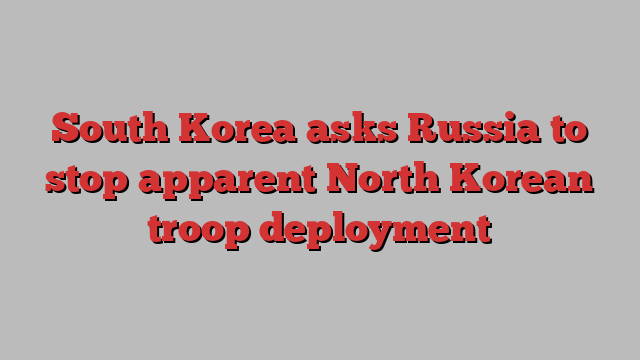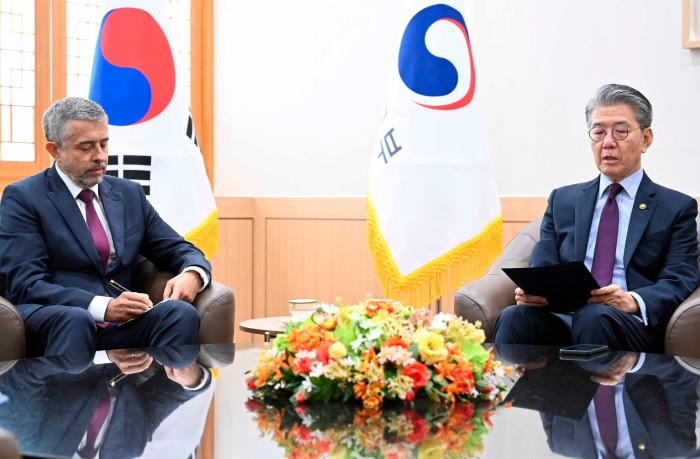
Unlock the Editor’s Digest for free
Roula Khalaf, Editor of the FT, selects her favourite stories in this weekly newsletter.
South Korea has called on Russia to stop the deployment of North Korean troops to fight on Moscow’s side in Ukraine, amid allegations by Seoul and Ukraine that North Korean commandos are on Russian territory and preparing for battle.
South Korean vice-foreign minister Kim Hong-kyun “strongly urged Russia to immediately to pull out North Korean soldiers and to end their co-operation”, South Korea’s foreign ministry said in a statement on Monday.
In a meeting with Russia’s ambassador to Seoul Georgy Zinoviev, “[Kim] pointed out that the fact that Russia-North Korea collaboration is moving beyond military equipment to the real dispatch of North Korean soldiers is a grave threat to international security and a violation of multiple UN security council resolutions and the UN charter.”
South Korea’s National Intelligence Service (NIS) last week published satellite images that it said showed North Korean troops being transferred to the far-eastern Russian port of Vladivostok on Russian naval ships earlier this month.
The NIS said on Friday that 1,500 soldiers from elite North Korean units were receiving training in Russia, having been issued with Russian military uniforms, weapons, and “fake identification cards” presenting them as residents of regions in Siberia. It added that a second deployment would be “carried out shortly”.

In response, the Russian embassy in Seoul issued a statement saying that Moscow’s co-operation with Pyongyang was consistent with international law, and was not directed against the security interests of South Korea. The Kremlin said the information about North Korea’s possible deployments was “contradictory”, sidestepping the issue of whether the troops had been sent to Russia.
“The DPRK is our close neighbour and partner. We are developing our relations in every area, and this is our sovereign right,” Dmitry Peskov, President Vladimir Putin’s spokesman, said on Monday, according to Interfax. “This should not raise any concerns for anyone, because this co-operation is not directed against third countries. We will develop this co-operation going forward,” Peskov told reporters.
Mark Rutte, secretary-general of Nato, said on Monday he had spoken to South Korea’s President Yoon Suk Yeol and discussed the issue. “North Korea sending troops to fight alongside Russia in Ukraine would mark a significant escalation,” Rutte said in a short statement after their call.
In June, Putin and North Korean leader Kim Jong Un signed a strategic partnership that includes a mutual assistance clause promising “immediate military and other aid” in the event of war.
Since the Kremlin’s full-scale invasion of Ukraine in 2022, North Korea has supplied Russia with rockets, ballistic missiles and millions of artillery shells, according to the Ukrainian, US and South Korean intelligence agencies, while Seoul and Kyiv say some North Korean military personnel are already on the ground in eastern Ukraine to monitor and assist with the deployment of these assets.
Last week, Ukrainian President Volodymyr Zelenskyy said he had intelligence reports that 10,000 North Korean soldiers were preparing to enter the war on the Russian side. “We know that there are 10,000 soldiers of North Korea, that they are preparing to send, fight against us,” he told reporters in Brussels. “This is the first step to a world war.”
Western capitals, under pressure from Kyiv to support Zelenskyy’s “victory plan”, have responded cautiously to the Ukrainian and South Korean claims.
A senior Nato official said the alliance had observed small numbers of North Korean personnel in Russia who were likely to be supervising the use of the country’s weaponry in Ukraine, but nothing on the scale of Kyiv or Seoul’s claims.
Go Myong-hyun, a senior fellow at the state-affiliated Institute of National Security Strategy in Seoul, said South Korea had little incentive to make exaggerated claims, given Seoul’s reluctance to be dragged into an open confrontation with Russia over the war in Ukraine.
A North Korean frontline troop deployment would pile pressure on South Korea to start direct supplies of lethal military equipment to the Ukrainians, he said. “South Korea has long resisted this, but we could be approaching the moment when the threshold for Seoul to begin direct supplies is finally met,” said Go.
China’s foreign ministry responded to questions about the deployment on Monday by saying that “all parties” should “work towards de-escalating the situation” and find a “political resolution”.
Analysts believe Beijing is concerned that any direct North Korean military involvement alongside Russia in Ukraine could implicate China in the conflict. If Pyongyang involves itself in one of Moscow’s wars and provokes retaliation against North Korea from Russia’s enemies, that in turn could trigger the mutual defence treaty with Beijing, analysts said.
Additional reporting by Joe Leahy in Hong Kong